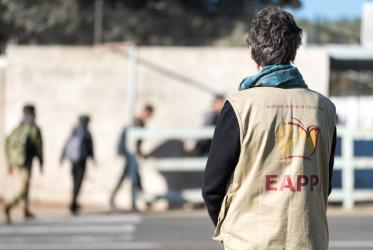By Marcelo Schneider (*)
At the World Social Forum (WSF) Free Palestine, young ecumenists from Brazil made their presence felt while advocating for peace in the Holy Land.
The forum took place from 28 November to 1 December in Porto Alegre, Brazil.
Based in the West Bank for some time, these young people had volunteered with the Ecumenical Accompaniment Programme in Palestine and Israel (EAPPI) of the World Council of Churches (WCC).
While the forum brought activists, intellectuals, movements, unions and organizations to express solidarity with the Palestinians, it also was an opportunity for these young ecumenists to share their experiences of working in Holy Land.
Nathalia Novaes Alves, age 27 and a former EAPPI volunteer, said, “Several international organizations are present in the Israel Palestine region, but they limit themselves only to recording human right violations. I hope we can see more initiatives in terms of conflict resolution.”
Regarding the newly upgraded status of Palestine in the United Nations as a “non-member observer state”, Alves expressed her hope that the “change of status will affect positively the way UN intervenes in the conflict”.
The group of young people also included Erico Loyola, 27, who volunteered with the EAPPI in the West Bank.
Sharing his views at the WSF, Loyola said that he considered the UN decision on Palestine a “victory of the international community”, yet he added that “there is a long way to go until the consolidation of a Palestinian state.”
“The great benefit of this resolution is that it can help the creation and access to more efficient humanitarian aid mechanisms for the people, who are suffering the consequences of this conflict,” said Loyola at the workshop.
Speaking about his time in the Holy Land, another EAPPI volunteer, Eduardo Minossi, 26, stressed the importance of peace initiatives by the churches and ecumenical organizations.
“The ecumenical movement’s perspective on peace and justice values dialogue. I believe that the EAPPI programme teaches us several news ways to join efforts for dialogue for peace in the region,” he said.
WCC staff members Manuel Quintero Pérez, the EAPPI coordinator, and Michel Nseir, programme executive for the WCC special focus on Middle East, also took part in the conversations.
For Nseir, “the ecumenical movement has the duty to build awareness among its member churches about the suffering of the Palestinian people and the importance to keep alive indigenous Christian communities.”
During discussions Quintero pointed out the importance of the forum in Porto Alegre: “It is extremely meaningful that this WSF edition in Porto Alegre was happening in the same days of this historical session of the UN. Through such initiatives we believe that the global civil society can play a role for peace and justice in Palestine and Israel”.
Participants of the WSF agreed that the UN decision gives the Palestinian people a sense of real possibility to have an independent state after a long period of struggle for freedom and dignity.
[486 words]
(*) Dr Marcelo Schneider works as the WCC communication liaison for Latin America based in Porto Alegre, Brazil.
Read also:
WCC sees positive step in Palestine upgrade at the UN (WCC news release of 30 November 2012)
Website of the Ecumenical Accompaniment Programme in Palestine and Israel
High resolution photos can be requested via photos.oikoumene.org








